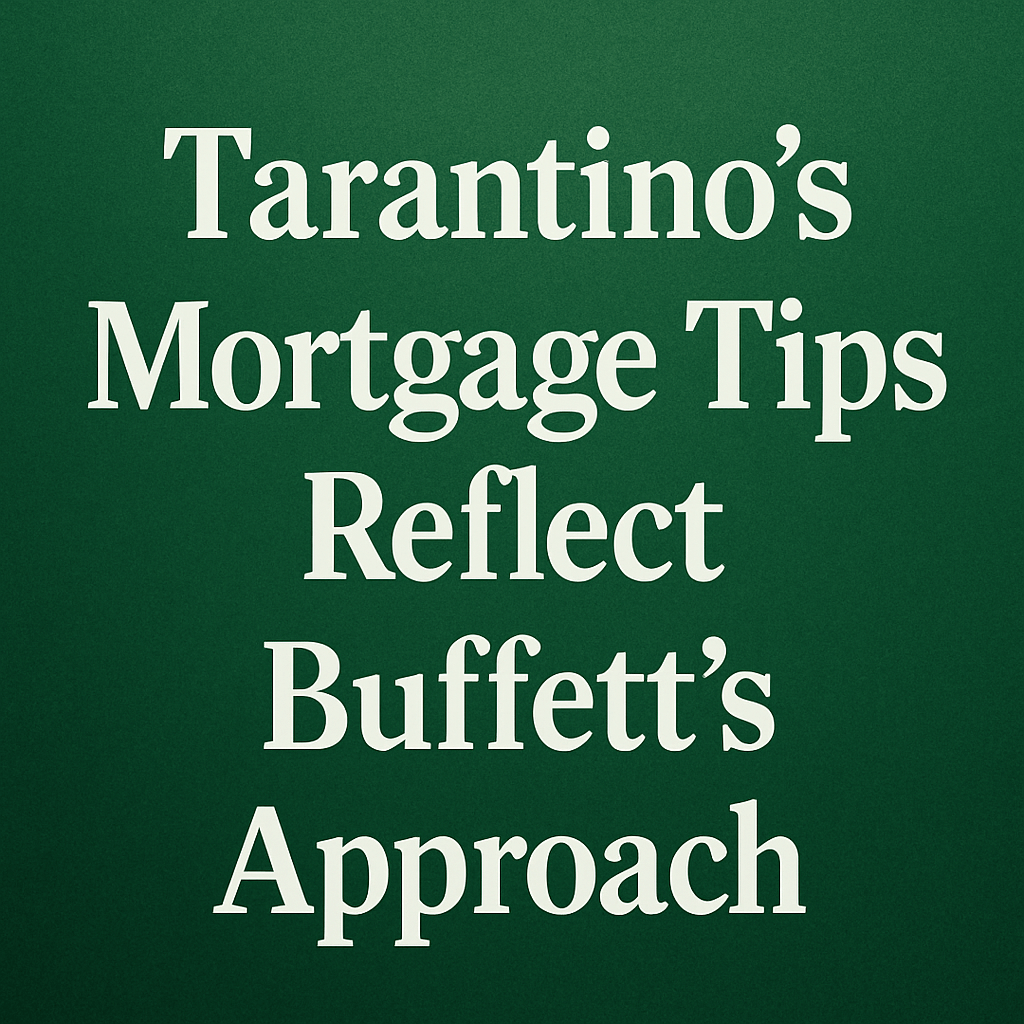Tarantino’s Mortgage Tips Reflect Buffett’s Approach

Hollywood director Quentin Tarantino has long been admired for his creative vision, but his financial discipline is equally noteworthy. In conversations with fellow filmmaker Eli Roth, Tarantino warned against rushing into a mortgage—even when early success tempts directors to showcase their wealth in bricks and mortar. This principle echoes the long-standing frugality of Warren Buffett, who still lives in the Omaha home he bought in 1958.
Origins of the Advice
After Eli Roth’s breakout hit Hostel grossed $80 million on a $3.8 million budget, Roth planned to use his first seven-figure paycheck as a down payment on a suburban mansion. Tarantino intervened:
“Don’t buy a house until you can afford to pay for it outright,”
he told Roth. “Otherwise you become an employee of your mortgage.” Roth took the advice to heart, delaying his first purchase until age 35, after three consecutive hits and a clear projection of future cash flows.
Technical Analysis: Mortgage Commitment vs. Liquidity
In financial planning, a mortgage is a long-term liability that can constrain cash flow and creative freedom. Key metrics include:
- Loan-to-Value (LTV) Ratio: Banks typically cap mortgages at 80% LTV. Carrying a 20% down payment still requires managing 100% of maintenance, taxes and insurance.
- Debt-to-Income (DTI) Ratio: Financial advisors recommend keeping DTI under 28% for housing costs to avoid liquidity stress.
- Amortization Schedule: Early payments are interest-heavy. On a 30-year, 4.5% fixed mortgage, only ~15% of the first year’s payment goes to principal.
- Liquidity Buffer: Maintaining at least six months of operating expenses in cash or equivalents preserves runway for low-income periods.
“Maintaining liquidity is paramount for anyone with variable income,” says CFP® professional Dr. Maria Sanchez. “When real estate debt grows, creative professionals may feel compelled to accept projects purely to service their mortgage, rather than pursue career-defining opportunities.”
Opportunity Cost in Creative Careers
Eli Roth’s decision to delay homeownership freed him to accept a $65,000 acting role in Inglourious Basterds—a choice that revitalized his craft and network. From a net present value (NPV) standpoint, passing on early real estate leverage allowed Roth to invest time in higher-return career moves. By contrast, a large mortgage payment can force directors into a short-term project cycle, often at lower marginal rates of return.
Cultural Context and Psychological Factors
Lifestyle inflation is a pervasive trap: as income rises, spending on status symbols—luxury cars, designer clothing, signature homes—often escalates in tandem. Behavioral economists refer to this as “hedonic adaptation.” Tarantino’s counsel combats this impulse, reinforcing that true stability comes from liquid reserves and diversified assets, not a singular trophy property.
Comparative Case Study: Buffett and Other Billionaires
Warren Buffett, now worth over $168 billion, still resides in the Omaha house he purchased for $31,500 in 1958 (roughly $350,000 in today’s dollars). The property is now valued at about $1.3 million—modest for a billionaire portfolio. Mexican magnate Carlos Slim and Microsoft co-founder Bill Gates similarly maintain long-held family homes, illustrating a pattern of real estate conservatism among the ultra-wealthy.
Implementation and Practical Guidelines
- Project Cash Flow: Build a three-to-five-year forecast of personal and business income. Ensure surplus after expenses, taxes and a proposed mortgage payment.
- Set Liquidity Targets: Maintain a working capital buffer equal to six to twelve months of living and business costs in cash or liquid instruments.
- Analyze Opportunity Cost: Evaluate the internal rate of return (IRR) on career projects versus the effective borrowing cost of a mortgage (current rates hover around 4–5%).
- Consult Experts: Work with a certified financial planner and a real estate market analyst to align your housing decision with long-term portfolio goals.
Conclusion
Quentin Tarantino’s advice—rooted in Warren Buffett’s decades-old practice—underscores the importance of financial flexibility. By postponing mortgage debt until cash flows are predictable and ample, creative professionals can shield their careers from the pressure of monthly liabilities and seize transformational opportunities.